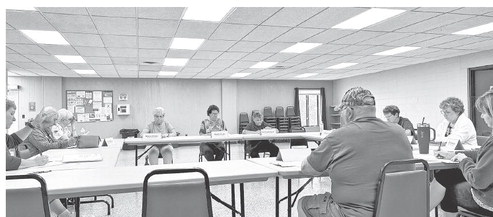County seeks copay changes, lower insurance deductible
If Taylor County makes no changes to its employee health insurance plan, the county will see no increase in premiums in 2026 from WCA Group Health Trust.
However, members of the county’s finance and personnel committees on Monday said they were willing to at least look at paying more in premiums to provide out of pocket cost savings to employees and their families for copay changes and reduction in deductibles.
The 0% proposed increase without changes is good news for the county as consultant Geoff Verges of USI had cautioned the county a month ago to expect a 5 to 7% increase. Based on that advice, committee members had directed the county’s finance director to build a 5% increase into the preliminary 2026 county budget.
Rather than advising the county to take the 0% renewal, Verges noted there were requests from a working group of county employees and that this may be a time for the county to consider those requests.
Under the current plan, most county employees pay $134.72 per month for a single plan or $333.96 per month for a family plan. Sheriff’s deputies pay a different amount based on their union contracts. County employees pay 17% of the total premium cost with the county taxpayers paying the remaining 83%.
The first request was to look at changing the copay for office visits. Currently there is a $30 copy for office visits and $75 for specialist visits. If the employees have met the deductible for the year, this would be all they paid, if they have not met the deductible they would pay the total cost of the visit until the deductible is met. For urgent care and emergency room care, the copay is $50 with the insurance paying the remainder and for emergency room care there is a $200 copay with the insurance paying the remainder.
Employees expressed concern that this was incentivizing people to use urgent care and emergency room care because it could be less costly to the employee than spending the out of pocket cost for the office visit.
Verges said he had spoken to WCA about that request and said that for a 1% premium increase they could adjust the co-pay language to be more consistent.
Committee member Mike Bub also called for the county to look at changes to lower the total deductible. The county’s current family plan has a total deductible of $9,500.
“To me that is a hell of a burden we are putting on our employees,” Bub said. He said he did not think other employers in the community had deductibles that high.
He questioned if the county was willing to go up to a 3% increase if that would give them leverage to lower the deductible. Verges suggested a better option for the county would be to increase the health reimbursement account (HRA) contribution from the county, which could be used to reimburse employees for qualifying medical expenses. That amount has been capped at $750 per employee for many years.
Employees also asked about health savings accounts (HSAs) which are available for employers who offer high deductible plans. Verges said the current county plan does not qualify as a high deductible plan. In an HSA, the money paid goes into an account owned by the employee and can be saved up over time.
Verges said they would need to increase costs to switch to a high-deductible plan.
Verges said one the main areas that impacts costs is the county’s copays for prescription drug coverage. The county’s current plan has set copays for prescription drugs including high cost medications. According to Verges, switching to a HSA qualifying plan would see that changing to where the employee’s HSA would be expected to pick up more of the prescription costs.
In citing the importance of the prescription drug coverage, Verges noted that $611,000 has been paid out in prescription drug coverage benefits over the past 12 months, up significantly from the $185,000 in drug coverage paid out the 12 months prior to that.
While the county could negotiate with the WCA Trust, it could also go out onto the market and get proposals from other vendors. Verges said he had no doubt the county could get a quote with a reduction in premium at least for this year in an attempt to get the county’s business, with the rate to go up in the following years. He said they would want a guarantee from any provider on a cap for the second year renewal. He said this is typically not to exceed a 9.9% increase the second year.
Verges noted that based on the past 24 months of claims history, the county is in a good position to negotiate with the WCA Trust. Bub agreed saying the county will never be in a stronger position.
Verges will bring the requests to the WCA Trust and come back next month with an update for the finance and personnel committees.
Budget proposal Last month, committee members directed that departments could go up to a 2% operational increase in their proposed budgets.
County board member Scott Mildbrand thought that was too generous and would leave departments increasing when they didn’t have to. On Monday, Mildbrand presented a budgeting proposal which he said would bring it back to the county board to spend any increase based on the overall county priorities.
Under his plan, the county’s budget would increase by the consumer price index, currently at 2.67%. Based on the 2025 budget of $33 million, this would give the county about $881,100 in budget increase in 2026.
According to Mildbrand, this amount would be inclusive of any health insurance, pay raises, or benefit increases. The money remaining after the wage and benefit increases would be available to allocate among departments within the county based on the board’s priorities.
A key part of the proposal was that department budgets would start at the current level for the coming year and each year’s base level would be based on the year prior. Bub objected to starting with what everybody got the year before. He said that just because departments got the same amount year after year, didn’t mean that was what they actually needed to run the department. He said the county needs to look at what is right for each department.
He gave the example of the sheriff’s department being told by the state that there are four Windows 10 machines that need to be replaced by October or they would not be able to log into the data records management system. Bub said each of the computers is $5,000 and the cost was unexpected. He noted in the human services department that two kids were put on placement recently which costs the county about $10,000 a week. Bub said he would favor a plan where the county would have a target of where it would want to be and what money there is available. He noted that the county saw $31 million in new construction in 2024 which will go on the tax rolls, with $9 million of that from the city of Medford.
Committee member Catherine Lemke said she liked the idea of Mildbrand’s proposal, but would like to see it be done at the same time as a regular budget review so that the county board could compare how it worked out.
Another part of Mildbrand’s proposal would be for all the assigned fund balances to become unassigned fund balances and come back to the general fund for the county board to allocate.
It was noted that grant funds and donations could not be legally taken from what they were intended to be used for. There are other legal requirements for funds that have to be carried over and how they can be used.
Bub agreed with the idea of reducing carryover accounts. He said they should be focusing on carryover of levy money.
Mildbrand said his proposal would allow the county board to do a better job analyzing and prioritizing how spending would take place. “Nobody ever said it would be easy to be a county board member,” Mildbrand said.
It was noted that even though department oversight committees are supposed to review the budgets, many just pass along the budget developed by the department head leaving it up to the finance committee to make any changes.
“Somehow we need to convince our department heads that we are trying to do the right thing,” said committee member Rollie Thums, addressing concerns from departments about plans to consolidate carryover funds. He said some are concerned that once the funds are out of their departments, they won’t get anything back.
“We are trying to do the right thing,” he said, adding that they are not trying to punish individual departments. In the end, no formal action was taken on Mildbrand’s proposal.
In other business, committee members met in closed session to discuss negotiation strategies for the sheriff’s department deputies and sergeants union contracts.
“To me it is a hell of a burden we are putting on our employees.”
— Supervisor Mike Bub





